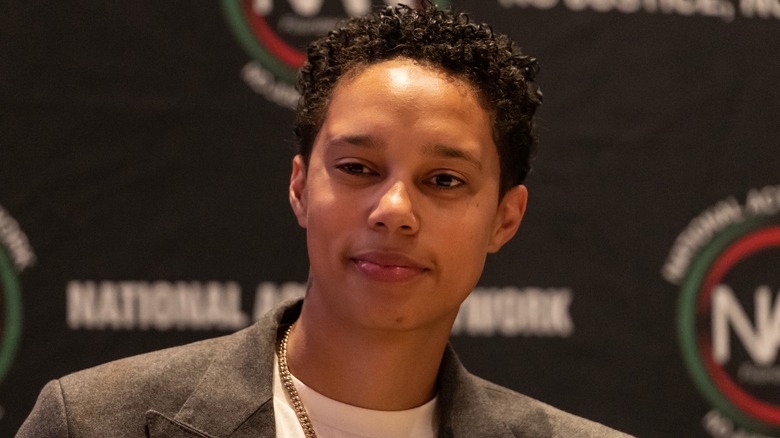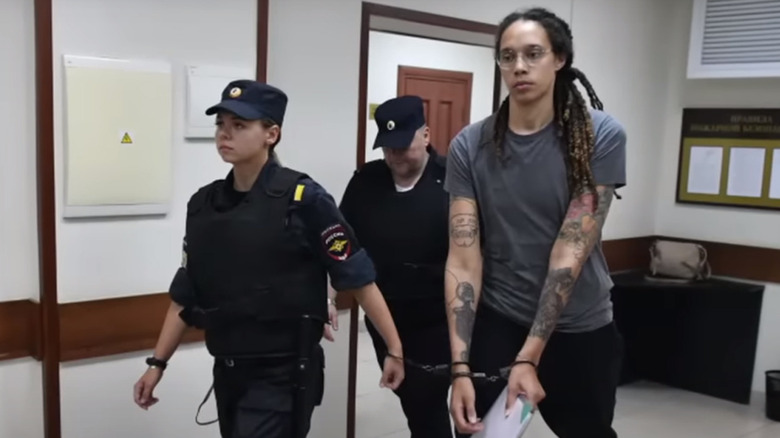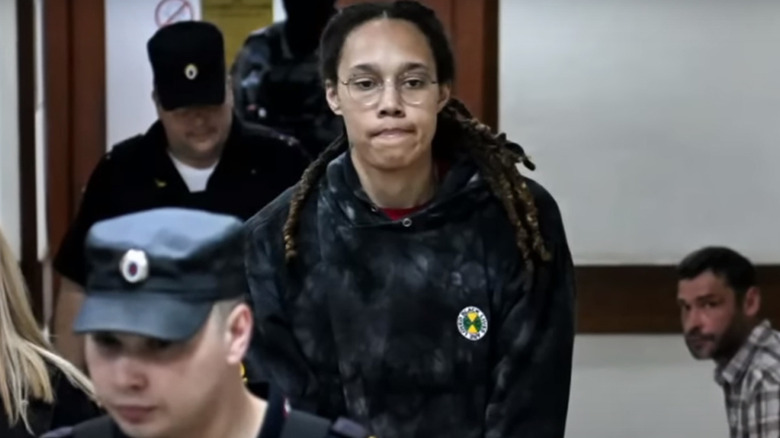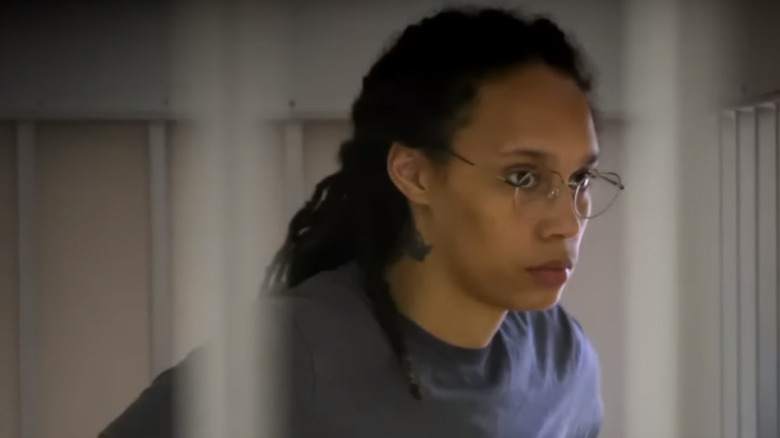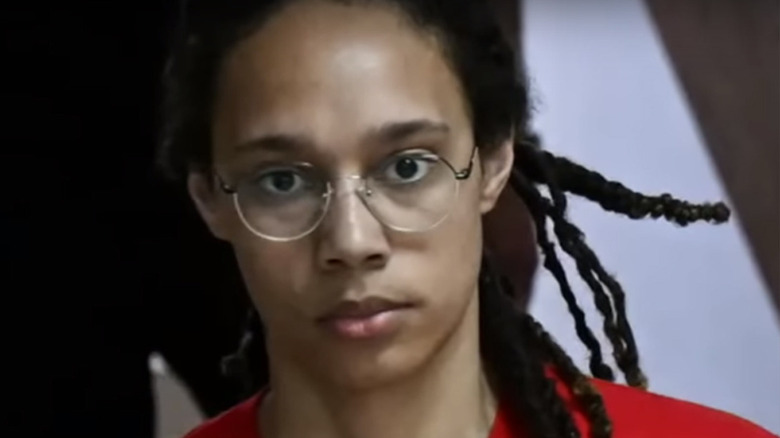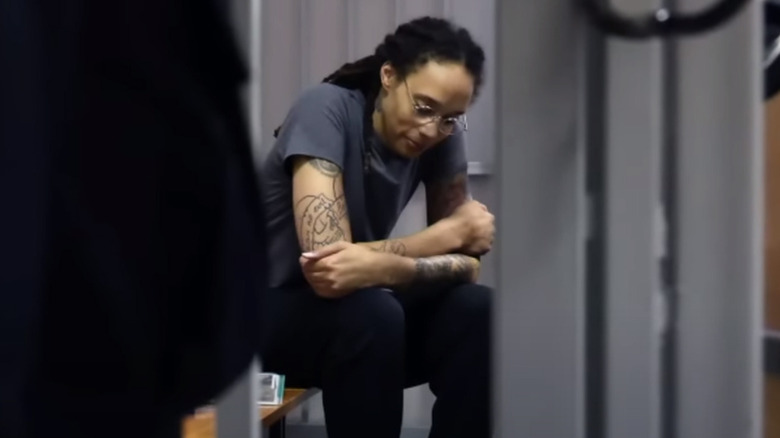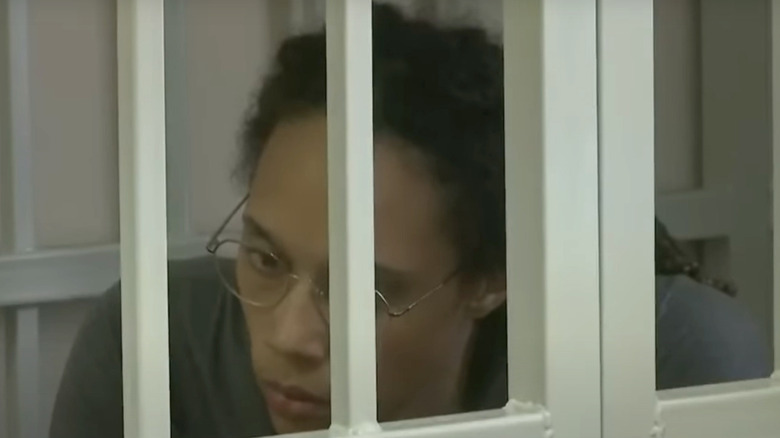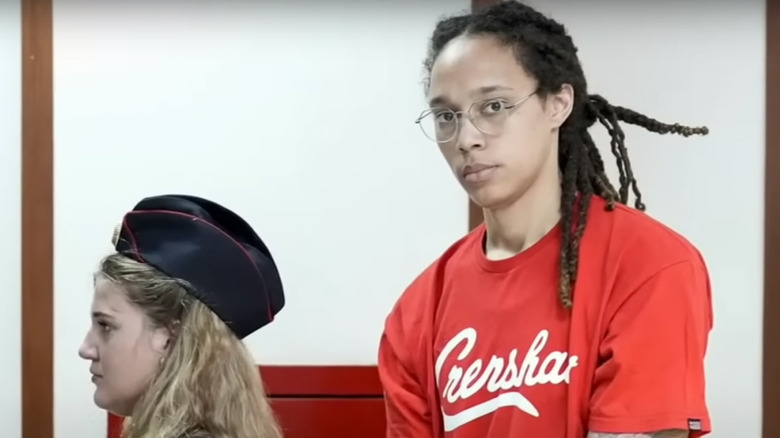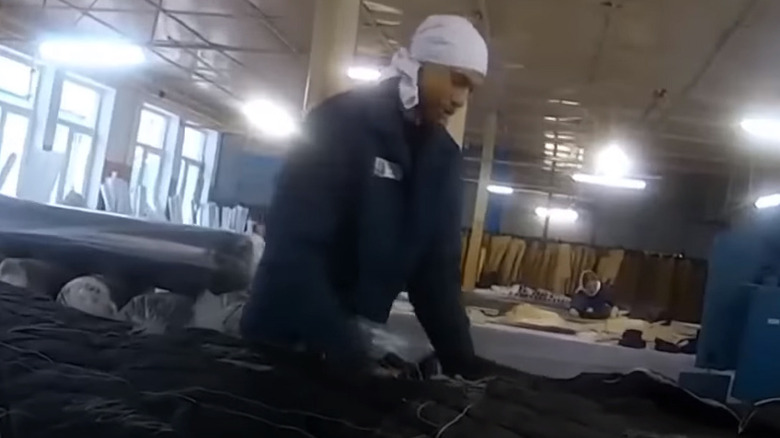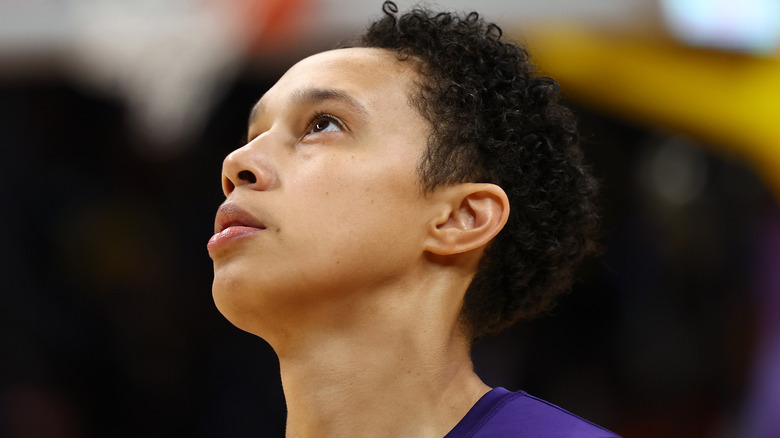What Brittney Griner's Life In Prison Was Really Like
To her fans, Brittney Griner is recognized as one of the most prominent women in basketball, earning such honors as being a college champion during her Baylor days, two Olympic gold medals, and several WNBA and EuroLeague titles. But others don't so much recognize the athlete for her accomplishments on the hardwoods, but for when she served hard time in Russia in 2022.
Griner's nightmare started when she was arrested upon arrival at an airport just outside of Moscow, where border officials arrested her on drug charges and promptly threw her into a detention center. The baller spent nearly a year in sub-par conditions in a country notoriously intolerant towards Americans, the LGBT+ community, and visible minorities. With political backroom dealings complicated by Russia's invasion of Ukraine, it looked like the only way Griner would ever regain her freedom lay in serving her sentence, assuming she survived.
Ultimately, she beat those odds. "I'm no stranger to hard times," Griner said at a media conference in the U.S. after she was freed, per ABC News. "You're going to be faced with adversities throughout your life. This was a pretty big one." The athlete hasn't fully elaborated on her experience, but several anecdotes and accounts from former prisoners in Russia have shed enough light to paint a picture of what she went through behind bars.
Why was Brittney Griner in prison?
Touching down on the tarmac of Sheremetyevo International Airport in Russia on February 17, 2022, it was supposed to have been business as usual for Brittney Griner. Just months earlier, she led the WNBA Phoenix Mercury to the league finals before losing to the Chicago Sky, and she was looking forward to her moonlighting job during the off-season playing for UMMC Ekaterinburg in the Russian league that paid considerably more than the $228,000 she was to earn that year in America.
Those hopes were dashed when border guards rifled through her luggage to find vape cartridges carrying hashish oil, a substance she used to mitigate pain. But in Russia, the substance is not only illegal, but it also carries a harsh prison sentence of up to 10 years. "A preventive measure in the form of detention was chosen against the American woman," said the Federal Customs Service of Russia in a statement. "Investigative actions are being carried out."
Unfortunately, the outside world was unaware of Griner's whereabouts. The threat of Russia invading the West-backed Ukraine loomed perilously at the time and became real a week later, dominating headlines. It wasn't until March that everyone else found out Griner was detained in Russia. "The war in Ukraine has essentially severed diplomatic ties between the U.S. and Russia," said Congressman and House of Representatives armed services committee member John Garamendi, per BBC. "That is going to exacerbate this issue."
She endured custody in a detention center
Prior to her trial, Brittney Griner was held in a detention center located in Novoye Grishino, a village about 50 miles away from Moscow. According to the mother of one of its former inmates, Naama Issachar — who was arrested on drug charges in 2019 — there wasn't a semblance of normal life in the facility. Upon getting wind of Griner's plight, Issachar recalled her daughter's distraught reaction to The New York Times, saying, "I know what she's going through now." She added that the WNBA star, who came out in 2013, might be subject to harsher treatment due to Russia's anti-homosexual laws.
Human rights activist Yekaterina Kalugina — who was able to visit Griner in prison — told The New York Times that Griner's daily schedule amounted to little more than waking up, eating breakfast in her cell, going for a walk in the courtyard, reading, and watching Russian television. Her cell had its own bathroom, although she was only allowed to shower twice a week.
Kalugina recounted that keeping in shape wasn't much of an option for the athlete. "Of course, it's hard for her not doing her training, and there is no gym equipment outside in the detention area where they exercise," she said to People. But she added that at least the staff extended the length of her bed to accommodate Griner's six-foot-nine-inch frame.
Griner was isolated from the outside world
Besides her freedom, Brittney Griner also lost contact with almost everyone she knew in the outside world. She also wasn't able to catch a glimpse of the village surrounding the complex, according to one former inmate. Yaffa Issachar recalled a remark made by her daughter Naama, whose drug charges led to doing time in the same detention center. "The clouds in Moscow are pretty," Naama said to her, per The New York Times, as that was all she could see beyond the walls.
Whatever Griner could glean came from the roughly 20 Russian television channels the prisoners could watch. Griner also had problems communicating with her wife, Cherelle, who expected a call from her in June 2022 to celebrate their fourth anniversary. Griner called several times that day but to no avail. It turned out the U.S. Embassy's Moscow desk responsible for connecting the two wasn't staffed that night.
Griner's lawyer managed to get her a copy of a Dostoevsky novel to read, but it seems that access to the athlete — or any inmate for that matter — was an arduous effort. Yaffa Issachar recalled how it would take four hours of filling out bureaucratic forms before she was allowed to see her daughter in a room separated by a pane of glass and chat via telephone. Any food she brought in was thoroughly checked by guards, going so far as to slice open tea bags to check for banned items.
She shared her cell with other inmates
Prison life wasn't easy for Brittney Griner, even though human rights activist Yekaterina Kalugina — who visited the WNBA star at her detention facility — said to The New York Times that she found the conditions in the complex were good. But it could have been worse, such as what P***y Riot member Maria Alyokhina experienced in a Moscow detention center. While jailed for publicly demonstrating against the Russian government in 2012, Alyokhina recalled the prison was so dilapidated, she and her cellmates stuffed window gaps with breadcrumbs and female sanitary products to keep warm. Alyokhina added that she was subject to regular strip searches, a stinking toilet (little more than a hole in the floor), and a radio that endlessly preached the virtues of Vladimir Putin.
Before her trial and sentencing, Griner was placed in a cell built for four occupants with a private bathroom, unlike most rooms designed to sleep eight. She also shared her quarters with two other inmates who spoke English. As it turned out, they were also confined as first-time drug offenders and didn't appear to have any issues with their American cellmate. On one occasion, Kalugina recalled Griner playing such board games as Battleship with the two. "She wasn't tearful, she was chatting away quite calmly," Kalugina told People about Griner's state of mind. "She didn't seem depressed; I've seen a lot of prisoners and in comparison she's doing really well."
Extended detention only added to Griner's anxiety
As the weeks went by, Brittney Griner was growing anxious. Hoping authorities would allow her to leave the facility where she was incarcerated in favor of house arrest, she grew more discouraged when her detention was extended in March, May, and June. It didn't help that the odds of beating the drug charge that imprisoned her in the first place were almost zero, as Russian prosecutors win 99% of their criminal court cases.
It was understandable that Griner, just before her trial was to take place in July, was probably questioning whether she would lose her freedom for good. When asked about Griner's composure, U.S. Diplomat Elizabeth Rood, after speaking with the athlete prior to her trial, detailed to NBC News, "She is doing as well as can be expected in these difficult circumstances."
In a letter she penned to President Joe Biden, which became public on July 4, Griner demonstrated fear about her future. "[As] I sit here in a Russian prison, alone with my thoughts and without the protection of my wife, family, friends, Olympic jersey, or any accomplishments, I'm terrified I might be here forever," wrote Griner (via CNN). "I voted for the first time in 2020 and I voted for you. I believe in you. I still have so much good to do with my freedom that you can help restore."
Griner pled guilty at her trial
On July 1, 2022, Brittney Griner finally had her day in Russian court. Each day of her hearing, she had to sit in a barred cage barely taller than she was and listen to the proceedings via a translator. A week into the trial, Griner opted to plead guilty to the drug charges, hoping that her decision would spark leniency in her sentencing.
"Considering the nature of her case, the insignificant amount of the substance, and BG's personality and history of positive contributions to global and Russian sport, the defense hopes that the plea will be considered by the court as a mitigating factor and there will be no severe sentence," said her legal team in a statement, per CNN. Throughout the trial, her defense argued that the cannabis oil discovered by border security was prescribed by her doctor and that the amount found in her luggage was insufficient to warrant a major sentence.
In the end, the judge didn't buy any of it, rejecting the talking point that the substance in her luggage — which weighed less than a gram — was minuscule. The magistrate also didn't believe the oil was legally prescribed and that Griner was oblivious to the consequences if she was caught. On August 4, Griner was sentenced to nine years in prison. "I made an honest mistake," said a despondent Grinder in court, per NPR. "And I hope that, in your ruling, that it doesn't end my life here."
She got stressed after receiving her sentence
Hit with a verdict that would leave her imprisoned in a hostile nation for nearly a decade, Brittney Griner found it hard to adjust to life after her trial. While prepping for an appeal, a last-ditch effort to free their famous client, Griner's legal team noticed her deterioration.
"Brittney is stressed and very much concerned with the future," lawyer Maria Blagovolina explained to People. One of Blagovolina's colleagues, Alexandr Boykov, noted that Griner was experiencing headaches and was emotionally distressed over being cut off from her relatives. "She suffers a lot without her family because she hasn't seen them for so long and it's very difficult to talk to them in any way," said Boykov to The New York Times. On October 18, Griner had an especially bittersweet celebration of her 32nd birthday behind bars, although her spirits brightened when she received messages of support from friends, family, and fans. "Thank you everyone for fighting so hard to get me home," Griner said in a statement, per the Associated Press. "All the support and love are definitely helping me."
A week later, Griner was devastated when the court declined her appeal. Worse yet, she was slated to be moved to a women's penal colony. Her destination would be IK-2 Mordovia, an institution notorious for its brutality and violation of human rights, and one that Russian women prisoners declare, per The Guardian: "If you haven't done time in Mordovia, you haven't done time at all."
Griner worked long hours in the penal colony
What awaited Brittney Griner at IK-2 Mordovia was a particularly harsh life, according to people previously incarcerated in the penal colony. After new prisoners are inspected for infectious diseases during a two-week quarantine period, authorities determine where they would stay in the complex, and place them in a dorm that sleeps 100 women. Their workday begins at 6 a.m., after which up to 16 hours daily would be spent sewing prison garments and Russian soldier uniforms.
Most alarmingly, inmates would allegedly be frequently subjected to physical abuse at the hands of fellow prisoners and guards. "The Russian prison system isn't interested in rehabilitation, it is based on retribution and punishment," said Judith Pallot, a University of Oxford professor who visited the facility, to The Guardian. "It is a system underpinned by violence."
It turned out that Griner was too lanky to sit at the workplace tables, with hands too large to handle the sewing machines. Instead, she was relegated to moving fabric around the facility. She also stayed out of trouble, according to CNN reporter T.J. Quinn, even though the athlete's height, nationality, and sexual orientation could have made her an easy target. At least she had some assistance, since she didn't know much Russian. "They assigned somebody who spoke English to her to help show her the rules," noted Quinn, "Because it's very easy in these camps to suddenly commit an infraction that gets your privileges taken away or put in solitary."
Footage revealed how she endured prison life
Folks fearing for the safety of Brittney Griner, doing time in a penal colony, were anxious to find out how she was faring. A 2021 U.S. State Department report on the Russian prison system didn't seem encouraging. "Conditions in prisons and detention centers varied but were often harsh and life threatening," said the report. "Overcrowding, abuse by guards and inmates, limited access to health care, food shortages, and inadequate sanitation were common in prisons, penal colonies, and other detention facilities."
However, images taken on November 28, 2022, by Russian state television, published a week later by the Daily Mail, showed Griner seemed to be relatively fine. The pictures featured Griner going through fabric while in standard issue coveralls and kerchief, making her bed, waiting in line for food in the prison cafeteria, and eating with a fellow prisoner. The only visible difference was that the basketball star's trademark flowing locks were gone.
Griner apparently cut her hair on her own accord, since she couldn't dry her locks while being confined during a Russian winter. "She was freezing," noted CNN personality Erin Burnett. "An indication Griner thought she would be serving her sentence for many more months to come." Fortunately for her, it didn't come to that. Additional shots taken December 8 revealed Griner signing documents while wearing a green winter overcoat and then boarding a bus. Those papers turned out to be documents signifying her release from the IK-2 complex after three weeks of incarceration.
Griner's release from prison after nearly a month behind bars
Brittney Griner's release from prison in Russia had nothing to do with an authority's change of heart or her legal team convincing a judge to overturn her lengthy sentence. Instead, the U.S. State Department had been working on a prisoner swap to free the athlete for several months. The exchange involved bringing Griner back home, but in turn giving up Russian arms dealer Viktor Bout, otherwise known as "The Merchant of Death," who had been behind bars in the U.S. for 10 years.
After being released from IK-2 Mordovia, Griner was whisked aboard a plane headed for Abu Dhabi, where the exchange was to take place. A video revealed that once in Abu Dhabi, Griner and Bout passed each other as they headed for the respective contingents waiting to take them home. Once seated in the plane, Griner had only one word to express her feelings (via The New York Times): "Happy."
U.S. President Joe Biden had more to say about the results of the government's efforts to secure her freedom. "She's safe, she's on a plane, she's on her way home after months of being unjustly detained in Russia, held under intolerable circumstances," he announced (via The Guardian). "Brittney will soon be back in the arms of her loved ones, and she should have been there all along." Griner's wife, Cherelle, was far more animated in her response. "Today's just a happy day for me and my family, so I'm gonna smile right now," she said (via People).
She adjusted to life back in the United States
On December 9, 2022, Brittney Griner finally touched down on U.S. soil in San Antonio, Texas, where she was driven to Brooke Army Medical Center to be examined for any conditions related to her 10-month stay in prison. But it wasn't until April before she publicly revealed what it was like to be behind bars.
"I have that mindset — no man, no woman left behind," she said at a media conference, per ABC News. "So it hurts. It hurts, it hurts. Because no one should be in those conditions. Like hands down, no one should be in any of the conditions that I went through or they're going through." That month, Griner revealed on Instagram her plans to put out a book about her harrowing experience in Russia. "Readers will hear my story and understand why I'm so thankful for the outpouring of support from people across the world," she wrote.
Griner was physically well enough to play basketball for the Phoenix Mercury, who signed her to a one-year deal worth $165,100 in February 2023. But throughout the season, she sat out a few games to deal with her mental health. In August, Phoenix failed to make the playoffs for the first time since 2012, and Griner became an unrestricted free agent at the end of the season. "It's not good being at the end of the standings," Griner said to ESPN. "But it's better than where I was a year ago."

